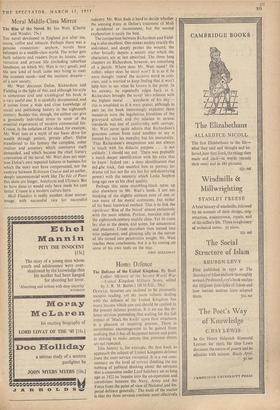Moral Middle-Class Mirror
Tuts novel developed in England just after tea, cocoa, coffee and tobacco. Perhaps there was a genuine connection : anyhow, novels have belonged to a middle-class world. The writer gets both subjects and readers from its leisure, con- versation and private life (including suburban loneliness, on which Mr. Watt is very good); and the new kind of book came into being to meet the insistent needs—and the insistent dreams— of a new society.
Mr. Watt discusses Defoe, Richardson and Fielding in the light of this, and although his style is sometimes arid and sociological his book is a very useful one. It is carefully documented, and it comes from a wide and close knowledge of social and publishing history in the eighteenth century. Besides this, though, the author can give a genuinely individual stress to some of the essential experiences of modern commercial life. Crusoe, in the isolation of his island, for example, Mr. Watt sees as a myth of our basic drive for wealth through patient, private effort. Defoe transferred to his fantasy the complete, sober realism and accuracy which commerce itself demanded, and which became the chief literary convention of the novel. Mr. Watt does not men- tion Defoe's own repeated failures in business for which the story may have compensated, nor the contrast between Robinson Crusoe and an earlier, deeply uncommercial work like The Isle of Pines (his shots are longer, Autolycus and Ulysses). But to have done so would only have made his case better. Crusoe is a modern culture-hero.
Moll Flanders is really another, done mirror- image, with successful vice for successful industry. Mr. Watt finds it hard to decide whether the seeming irony in Defoe's treatment of Moll is accidental or inconsistent; but the second explanation is easily the best.
The comparison between Richardson and Field- ing is also excellent. One makes society crucify the individual, and deeply probes the wound; the other broadly depicts a society into which the characters are at last absorbed. The three long chapters on Richardson, however, are something of a puzzle. Where does Mr. Watt stand? Or rather, where does he stand now? It is as if he once. thought 'moral' the decisive word in criti- cism, and is worried to keep finding that it won't help him to say what he knows is the point. In his anxiety, he repeatedly edges back to it. Richardson brought the novel 'into relation with the highest moral . . . standards of his day'— this is amplified as if it were praise; although in part (as the book interestingly explains) these standards were the lugubrious frivolities of the graveyard school, and the relation to serious standards was one of conformity with outrage. Mr. Watt never quite admits that Richardson's greatness comes from (and needless to say is limited by) not his morality but his immorality. 'That Richardson's imagination was not always in touch with his didactic purpose . . . is not unlikely.' I should say not. 'There was probably a much deeper identification with his rake that he knew.' Indeed yes: a deep identification that did .the trick, that enabled him to portray his drama (of lust not for sex but for self-destroying power) with the intensity which Leslie Stephen long ago saw as his chief quality.
Perhaps this same stumbling-block turns up also elsewhere in Mr. Watt's book. I am not thinking of the slightly anxious note of one or two more of his moral comments, but rather of his basic historical method. This is to link the significant 'Rise of the Novel' almost exclusively with the most solemn, Puritan, moralist side of the eighteenth-century middle class. Yet its roots lay also in the desire, and scope, for amusement and pleasure. Crude moralism then turned into wise judgement, and glancing idly in the mirror of life turned into penetrative insight. Mr. Watt reaches these conclusions, but it is by sawing up some of his own tools on the way.
JOHN HOLLOWAY


































 Previous page
Previous page